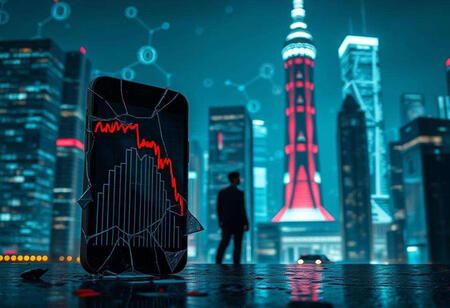
AI Surge Drives Market Frenzy as Jefferies Raises Red Flags


Though spending on Artificial Intelligence (AI) is fueling one of the most intense bull markets in US stocks, global brokerage Jefferies has warned investors of increasing indications of speculative excess, even as gold and Chinese tech stocks rise.
In the most recent GREED & Fear report, Jefferies noted that the US stock market surge, mainly driven by AI-related capital investments and passive fund inflows, has contributed almost $15 trillion to the market value of the S&P 500 since April, an amount representing half of the nation's GDP. The excitement, however, occurs alongside a nearly 10 percent decline in the U.S. dollar index this year, its poorest showing since 2017.
The report referenced the ecstatic response to Oracle's quarterly earnings as an obvious sign of mania. Oracle's shares surged nearly 40 percent in one day earlier this month following the announcement of a five-year, $300 billion agreement with OpenAI. Nvidia quickly responded by committing as much as $100 billion to assist with OpenAI's data center expansion. Jefferies compared this pattern of vendor financing to the tech bubble of the early 2000s, cautioning that the model might first collapse in GPU rental companies like CoreWeave.
Also Read: Leadership Movements Heralding the Next Phase of Innovation and Growth
At the same time, the Federal Reserve's easing of policies persists in boosting optimistic sentiment, although new Fed Governor Stephen Miran's mention of a "third mandate" for controlling long-term rates suggested potential yield curve control—an event that Jefferies indicated would undermine the dollar and elevate gold prices.
Also Read: SCO Summit 2025: Outcomes of Modi-Xi Meeting
Outside of Wall Street, the rally in China driven by AI has accelerated, bolstered by mainland investments via Stock Connect. The Hang Seng Tech Index has surged almost 43 per cent in 2023, significantly surpassing the Nasdaq's 16.5 per cent increase. Alibaba, known as China's "AI engine," has experienced a 109 per cent increase in its stock this year, while Tencent has risen by 56 per cent.
Jefferies observed that Western investors, a number of whom had earlier labeled China as "uninvestable," are now reevaluating their position after seeing the mainland's swift progress in semiconductors, robotics, and clean energy. President Xi Jinping is anticipated to meet U.S. President Donald Trump at next month's APEC Summit in Korea, possibly setting the stage for a trade improvement that could attract global investments to Chinese stocks.
In Hong Kong, indications of stabilization are appearing. Retail sales increased slightly, IPO fundraising has more than doubled compared to last year, and trading volumes have risen significantly.
Also Read: 5 Latest CHRO Appointments in Global Corporations
Nonetheless, property markets continue to feel pressure, as office prices have decreased by 49 percent from their highest point in 2018, while retail properties have fallen by 41 percent. In contrast, residential housing indicates initial signs of stabilization as rents increase and inventory decreases.